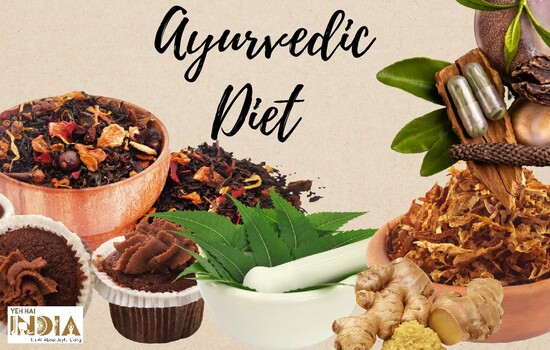Ayurvedic diet focuses on balancing the three doshas through use of specific food groups as a way to promote general well being.
Ayurveda, the ancient healing system has played a vital part in treatment and prevention of diseases.
For complete relief from different health problems, Ayurvedic health practitioners routinely recommend a fixed diet plan, also known as ‘Ayurvedic Diet’, along with the medicines.
In Sanskrit language, Ayurveda translates into ‘the science of life’ where Ayur means ‘life’ and Veda means ‘science’. It is common knowledge that Ayurvedic practices have existed in India for thousands of years, more as a way of living rather than a medical system.
It has also proven nearly impossible to break down this ancient school of medicine or prove it with evidence-based studies.
A reason for the lack of evidence could be the popularity of modern medicine that promises to treat the symptoms within a short time span. But the ill effects of these strong medicines last much longer and in turn weaken body immunity.
Modern medicine works on the belief that if a certain cure works for the majority, it should work for all. In reality, it is far from that which is why most of us are shocked when one treatment does not work for us as it should have.
Ayurveda was and is tailor-made to suit each patient’s body condition, so the whole treatment process takes a lot more time and effort on the doctor’s part.
The time spent on monitoring and understanding how the body works for one person is greater than what it takes to prescribe the medicine without examining a patient’s current health status or his health history.
This may work well on the first try for some but for others it might take a few months to respond favourably. Considering this variation in the recovery process of different individuals, it’s simply not possible to summarise the effect of Ayurvedic treatments for the masses.
Ayurveda’s core treatment is based on the existing body composition depending on which, Ayurvedic doctors devise a diet plan by selecting the right food type, and proper meal timings, helping the patient become aware of the body’s response to what they consume.
‘Let food be thy medicine’ is not just a quote but the basic principle around which the Ayurvedic medicine system revolves.
With this basic idea of the traditional practice of Ayurveda, let us delve into the diet it advises and how to choose one that suits your body’s needs.
In this article, we have tried to cover the basic rules of an ayurvedic diet for a balanced and healthy life.
10 Ayurvedic Diet Rules You Must Follow:
1. Dosha type and its effect on diet
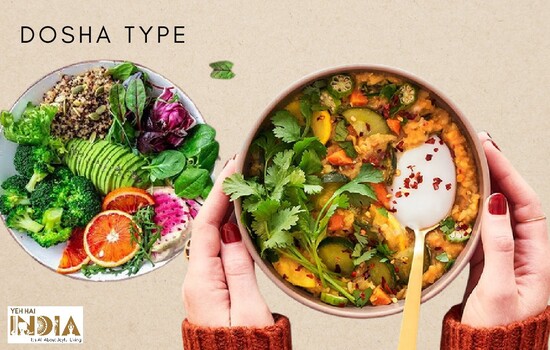
The imbalance in one of the doshas or the mind-body constitutions, known as vikruiti, means a disturbed physiological system.
The elements that are elevated are regulated by food which will restore the body’s health. To counteract the elevated doshas, we need to understand what these doshas or life energies are:
- Vata dosha – air and space elements
- Pitta dosha – fire and water elements
- Kapha dosha – earth and water elements
Normally, all of us have one prominent dosha, to balance which the other two undergo regular variations. Identifying your body dosha will guide you in deciding the type of food you should eat to keep your body balanced.
Recommended Story – Famous Top 10 Nutritionists (Best Dietician) to Follow in India
Here is a list of food items that suit each type of dosha:
| Food Groups | Pitta | Vata | Kapha |
| Protein | Poultry Egg whites Tofu | Poultry Seafood Tofu | Poultry Seafood Egg whites |
| Dairy | Milk Ghee Butter | Milk Butter Yogurt Cheese Ghee | Skimmed Milk Goat Milk Soy Milk |
| Fruits | Oranges Pears Pineapples Bananas Melons Mangoes | Fully ripe, sweet, and heavy fruits like: Bananas Blueberries Strawberries Grapefruit Mangoes Peaches Plums | Apples Blueberries Pears Pomegranates Cherries Raisins Figs Prunes |
| Vegetables | Cabbage Cauliflower Celery Cucumber Zucchini Leafy greens Sweet potatoes Carrots Squash Brussels sprouts (sweet and bitter vegetables) | Cooked vegetables including the following: Beets Sweet potatoes Onions Radishes Turnips Carrots Green beans | Asparagus Leafy greens Onions Potatoes Mushrooms Radishes Okra |
| Legumes | Chickpeas Lentils Lima beans Black beans Kidney beans | Chickpeas Lentils Mung beans | Black beans Chickpeas Lentils Navy beans |
| Grains | Barley Oats Basmati rice Wheat | Cooked Oats Cooked Rice | Oats Rye Buckwheat Barley Corn Millet |
| Nuts & Seeds | Pumpkin seeds Flax seeds Sunflower seeds Coconut | Almonds Walnut Pistachios Chia seeds Flax seeds Sunflower seeds | Pumpkin seeds Sunflower seeds Flax seeds |
| Herbs & Spices | Black pepper Cumin Cinnamon Cilantro Dill Turmeric | Cardamom Ginger Cumin Basil Cloves Oregano Thyme Black pepper | Cumin Black pepper Turmeric Ginger Cinnamon Basil Oregano Thyme |
2. Avoid snacking in between meals
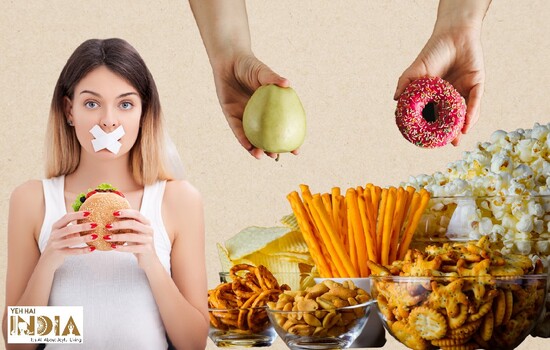
The digestive cycle after each meal occurs in three phases. The first hour when you feel full and sedate after the meal is when the Kapha energies in the body rise.
In the next 2 to 4 hours, the body temperature increases with the hydrochloric acid in the stomach and the internal heat (Pitta elements).
This is when the food is digested and stored in the body as sustainable energy. Following this, the 4th to 5th hour after a meal is when you begin to feel the lightness again, meaning the Vata energies are in play now.
So, snacking after a meal results in disrupting this cycle and the doshas. It leads to incomplete digestion and toxin accumulation which in the long-term irreversibly affects your health.
3. Focus on quantity
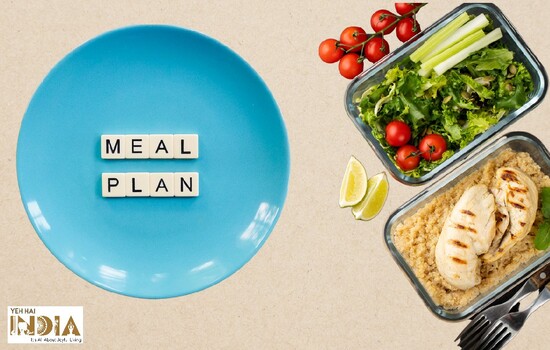
Always eat only after you start to feel light and your appetite returns after the previous meal. Eating before that will disturb the digestive cycle whereas eating past the feeling of satisfaction.
Do not overstuff your stuff as it might result in a lot of undesired effects as well. Weight gain and free radical production in the body are some detrimental effects of overeating.
It causes the body to work more to digest the extra food and store unnecessary calories.
4. Consume whole foods
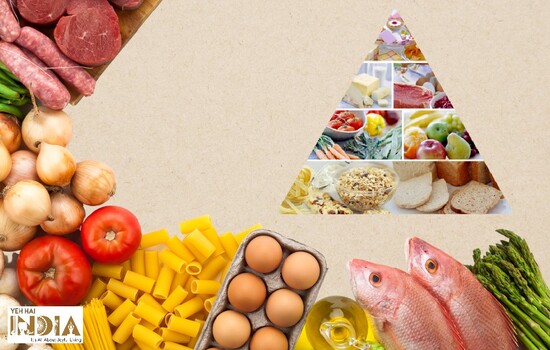
Fresh, whole foods are the best choice for a healthy life. Any food from the moment it is picked up from the earth starts losing its prana – life force.
Since the nourishment we require comes directly from the prana of food, eating fresh food provides more sustainable energy to the body than food that comes from a can. Avoid preserved food items of any sort.
5. Include six flavours in a meal
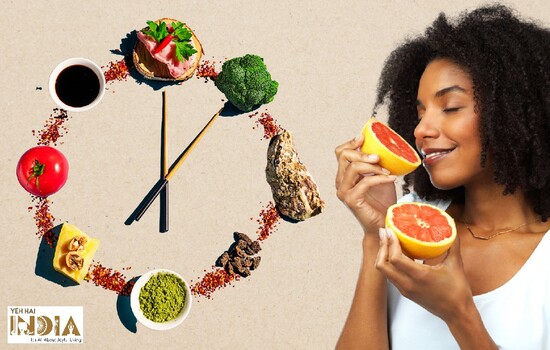
The six tastes to include in your diet are sweet, sour, salty, bitter, astringent and pungent. Combining all six tastes in every meal stimulates the palate that in turn stimulates a body’s various physiological activities.
Incorporate small amounts of each taste in every meal like adding a squeeze of lemon, a pinch of salt, a spoon of honey or sugar syrup, etc.
6. Avoid frozen and cold food items
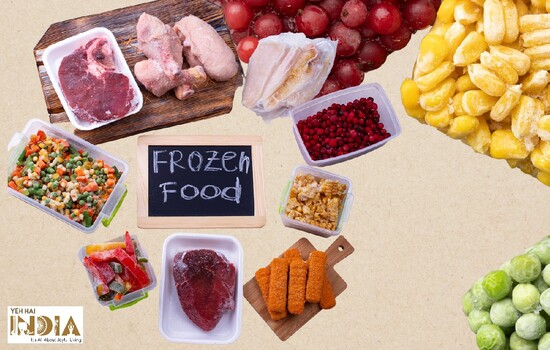
The digestive power, also called the inner agni is the body’s heat which majorly regulates the digestive cycle. The heat ideally burns the food and stores up the energy produced in the cells.
Continuous consumption of cold or frozen drinks and food will result in diminishing the overall heat of the body.
Those with Vata and Kapha doshas may benefit from warm food and drinks whereas the Pitta doshas may get positive results with cold foods and drinks. But frozen food and drinks are not recommended any time of the day for all 3 doshas.
7. Eat slowly and peacefully

Ayurveda practitioners believe in connecting with the inherent energy of a body during meal time.
Distractions like phones, laptops, television, books, etc don’t let you be aware of the energy you are putting inside your body during mealtime.
Try having a meal in silence focusing just on the food and your body to feel the difference from the clutter we tend to fill our minds with, especially during a meal.
Recommended Story – 10 Super Healthy Nuts To Include In Your Diet
8. Sleep 3 hours after a meal

Sleep is crucial for your body and mind to recover and heal from everything you experience during the day.
Finishing a meal and sleeping right after it takes away the time and energy your body needs to digest the food. This in turn impacts your sleep quality and makes you feel lethargic the following day.
This is why the last meal of the day has to be light and consumed at least 3 hours before bedtime.
9. Herbal Teas

Instead of opting for cooler beverages, warm teas serve better for all types of doshas. They have healing properties when consumed once or twice daily.
Having tea between your meals can be limited to 2 to 3 cups which also reduces your snack cravings and offers a host of antioxidants to improve your body immunity..
Teas also have detoxification effects on the body that not only removes toxins but also improves digestion.
We have some tea recommendations for the 3 doshas here:
Vata dosha – cinnamon, ginger, cloves
Pitta dosha – peppermint, coriander, rose
Kapha dosha – liquorice, black pepper, cardamom
10. Have a large lunch
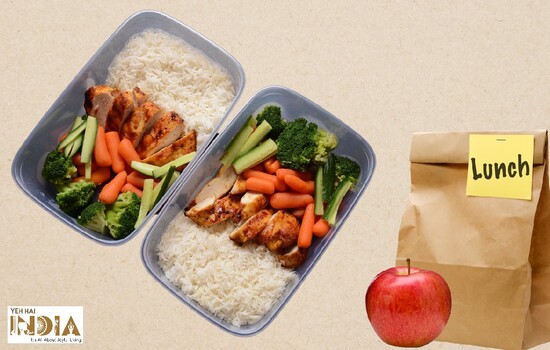
Ayurveda recommends your lunch to be your biggest meal of the day. The agni in the body is the highest when the sun is right above the earth, i.e., in the afternoon.
So, a big meal at this time of the day can be digested easily with the increased heat in the body and store up enough energy for you to get through the rest of the day.
If you feel like cheating on your diet and having that sugary dessert, the best time for you to splurge is at noon.
Also, a cool drink at noon does not affect the doshas as much as it does at any other time of the day.
Summary:
When you find yourself unsatisfied with your unhealthy eating habits, Ayurvedic diet proves to be of massive help in guiding you on the type of foods that are best for you and the right time of consuming each food.
According to Ayurveda, starting your day with your first meal at sunrise and finishing off with your last meal just before sunset is crucial to maintain healthy digestion and strengthen the immune function.
Opting for foods that are easily digested as per your dosha, Vata, Pitta or Kapha rewards you physically and mentally and guarantees complete freedom from diseases.
Eat as per the Ayurvedic rules to remain healthy and lead a life free from distractions that diminish your peace of mind.
Also Read – Checkout these Dietary Guidelines During Festivals


